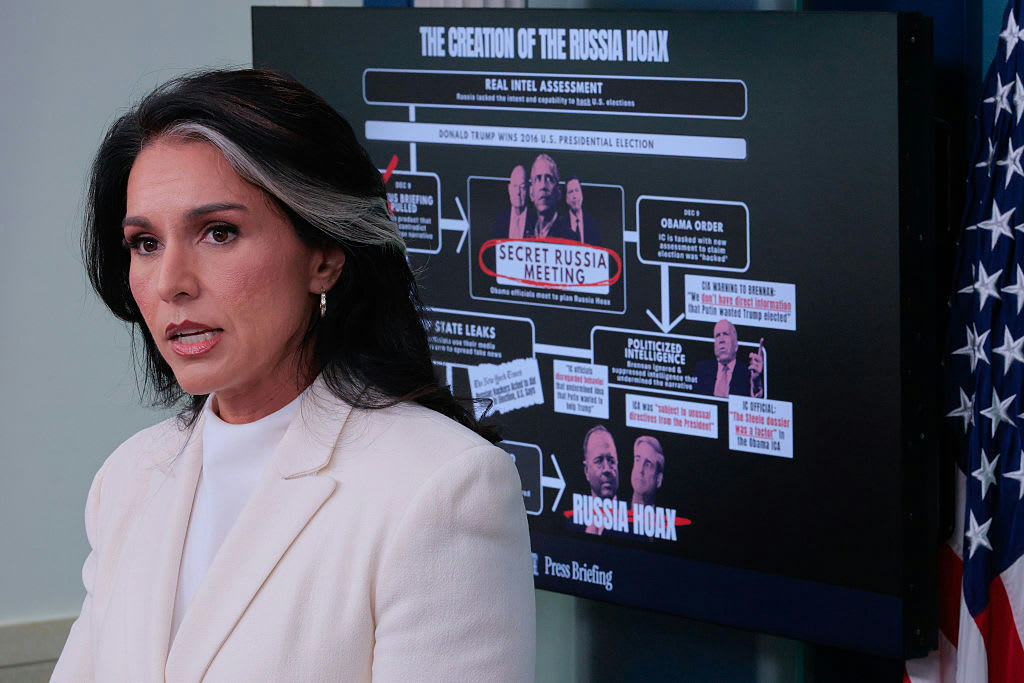Transcript: Rep. Mark Meadows on "Face the Nation," May 27, 2018
Chairman of the conservative House Freedom Caucus Rep. Mark Meadows, R-North Carolina, is one of President Trump's ardent supporters in the House today.
Meadows sat down with "Face the Nation" to discuss lawmakers' briefing with intelligence officials amid concerns over the FBI's use of an informant during the Trump campaign in 2016 as well as ongoing efforts for immigration reform on Capitol Hill.
The following is a transcript of the interview with Meadows that aired Sunday, May 27, 2018, on "Face the Nation."
MARGARET BRENNAN: We're back with one of the president's biggest supporters in the House, Congressman Mark Meadows. Thanks for joining us.
CONGRESSMAN MARK MEADOWS: Great to be with you. Thanks so much.
BRENNAN: We were just talking to Director Clapper about what the president calls spy gate --
REP. MEADOWS: Right.
BRENNAN: You've had a lot of questions about this. We saw the Justice Department hold this extraordinary briefing with leadership on the Hill showing some classified materials. I know you weren't in those meetings. But tell me if you're satisfied.
REP. MEADOWS: Well, to be clear - no documents were shown. And so there was a briefing, but yet there were no documents that were shown. We're hopeful that that will happen in the coming days as long as we can protect the sources and methods that are important to all Americans. And yet at the same time, we continue to see this dragging out of a narrative, you know, where we're not seeing documents, where we're not getting the type of transparency that really members of Congress have requested for seven or eight months. And so -
BRENNAN: What do you think the FBI did and who do you think they did it to -
REP. MEADOWS: Well, I mean what we do know is that there was indeed a confidential human source is-is what the FBI would call it that was-was actually giving intel. Not only to the FBI but you have to ask the question when did it start? We do know that actually those confidential human sources were engaging prior to the official FBI investigation. So the question begs - at whose direction, you know, what were they collecting and who were they reporting to? Because that was happening before the FBI actually opened an investigation. And so as we know that, and we know that from nonclassified sources. There is no question that there was a spy that was collecting information. The definition of that - somebody who does something in secret without the knowledge of another person.
BRENNAN: But you know in legal standards that's different in terms of how law enforcement works with informants?
REP. MEADOWS: Well but an informant is someone who if-if they had information on you and went to the FBI and said you know, listen we have this wrongdoing, we're giving you some information where it was not directed or where the initiation of it was not from the informant. We know that actually they initiated the contact between members of the Trump campaign and at whose direction? And at what point do we as Americans say it is not right to spy on a campaign whether it's Donald Trump's or Bernie Sanders', it's not right.
BRENNAN: Well the Senate Majority Leader Mitch McConnell, Senator Rubio who was on this show said they haven't seen evidence to back up the claim that there was someone spying -
REP. MEADOWS: Look, I'd be glad. Listen, I've got non-classified stuff Margaret. And if they want to come by my office. Senator Rubio is a dear friend. He can come by. We've got, you know, text messages that acknowledge the existence of that and so -
BRENNAN: If you have people around your campaign or in your office who were being contacted or trying to make contact with foreign powers would you want that looked into and surveilled -
REP. MEADOWS: Sure, but therein is another problem. If the FBI knew it was going on, why did they not do a defensive briefing? Why did they not go to the nominee and say by the way here is a problem - you've got somebody that you've never met. Carter Page, who had never met the president, that is having inappropriate contact with someone. We want to make you aware of it. Why was that never done? And it still to this date has never been done.
BRENNAN: I want to ask you as well about immigration because we could talk all day about the other topic. The president tweeted yesterday that it's a horrible law to have parents separated from their children if they cross the border illegally. Do you agree it's horrible?
REP. MEADOWS: Yeah I think it is a horrible law. It's one of those that actually --
BRENNAN: Do you want to change it?
REP. MEADOWS: -- actually, I think there is real bipartisan support for changing that. Here's one of the interesting things as we've been in these negotiations on trying to fix the immigration problem. This came out just the other day, and I said I can't imagine that it's the law that you have to separate these individuals. Now, obviously human trafficking is a big deal. You know, how do you know that they're really the parents in a family unit? So we would have to address that, but I think conservatives and moderates, Democrats and Republicans all agree that keeping a family together is the best strategy, and it's something we-we need to address and will address.
BRENNAN: Do you see this as part of other immigration reform because we've seen this week the GOP sort of fighting within itself over the direction to take, particularly with status?
REP. MEADOWS: Yeah and we're very close on that. I can tell you--
BRENNAN: A path to citizenship or a path to status?
REP. MEADOWS: Even making sure that those DACA recipients don't have to face deportation and that ultimately they can become citizens. Now the debate becomes over should there be a special pathway? Should they go to the back of the line? Should they go to the front of the line? And obviously those are things that we have to negotiate on.
BRENNAN: Do you have an opinion on that?
REP. MEADOWS: You know I don't think that someone who comes here illegally should get to go to the front of the line. At the same time, as we deal with this, it's an emotional topic. My district is very different from some of my other moderate friends. And yet we're having real conversations within the last 48 hours on trying to get a resolution. The president wants a DACA -
BRENNAN: Some kind of status but not citizenship?
REP. MEADOWS: Well no it's not even that. I think that even in some of the more conservative bills that have been talked about there is the ability to become citizens. And so, that's the narrative that's not really out there and so it's important that we look at all of that. The most important thing is to secure our southern border so that we don't have to deal with this problem a decade from now two decades from now. And I think that's - we're well on our way to doing that.
BRENNAN: Congressman, thank you very much for joining us.
REP. MEADOWS: Thank you.



